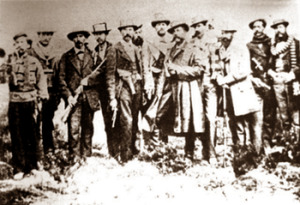| Battle of Topáter | |||||||
|---|---|---|---|---|---|---|---|
| Part of the War of the Pacific | |||||||
 Eduardo Abaroa and the defenders of Topáter | |||||||
| |||||||
| Belligerents | |||||||
| | | ||||||
| Commanders and leaders | |||||||
| | | ||||||
| Strength | |||||||
| 554 soldiers | 135 militia and soldiers | ||||||
| Casualties and losses | |||||||
| 7 killed 6 wounded | 20 killed 3 wounded 24 captured | ||||||
The Battle of Calama or Battle of Topáter was fought on March 23, 1879 between Chile and Bolivia, and was the first battle of the War of the Pacific.
The Chileans were taking possession of the Antofagasta (Litoral) province, at that time a part of Bolivia. The Bolivian troops, quite few in number, decided to make a stand in the town of Calama. On their way to occupy Calama, 554 Chilean troops, including cavalry and with two Krupp rifled guns, were opposed by 135 Bolivian soldiers and civilian residents led by Dr. Ladislao Cabrera, a civilian and a political authority in the region.
The Bolivians presented battle next to the Topáter ford, which runs outside the city. Cabrera dug in at two destroyed bridges; calls to surrender were rejected before and during the battle. Outnumbered and low in ammunition, most of the Bolivian force eventually withdrew, except for a small group of civilians led by Colonel Eduardo Abaroa that fought to the end.
The Bolivian national hero, Colonel Abaroa, died in this battle. Further ground battles would not take place until the war at sea had been resolved.